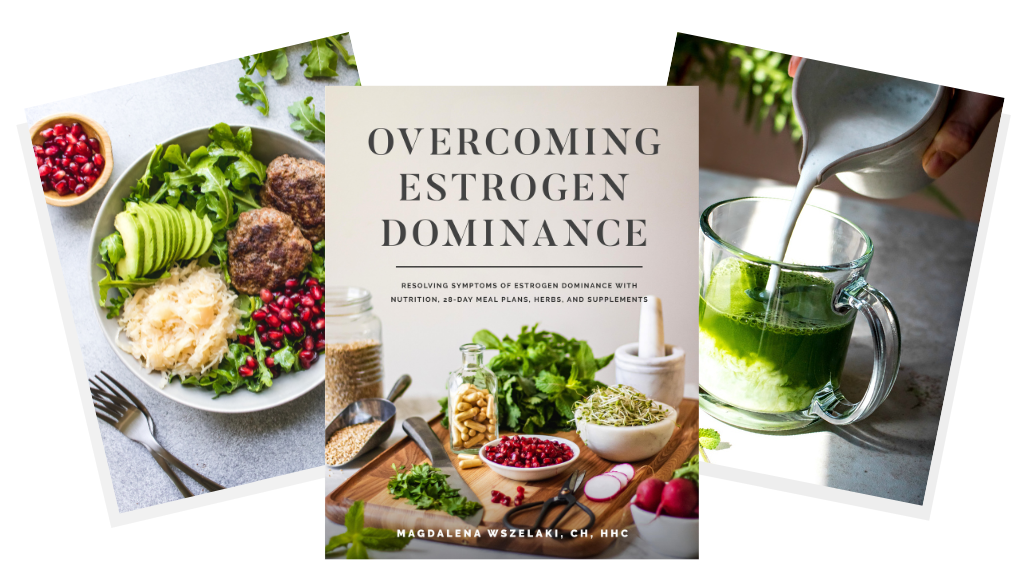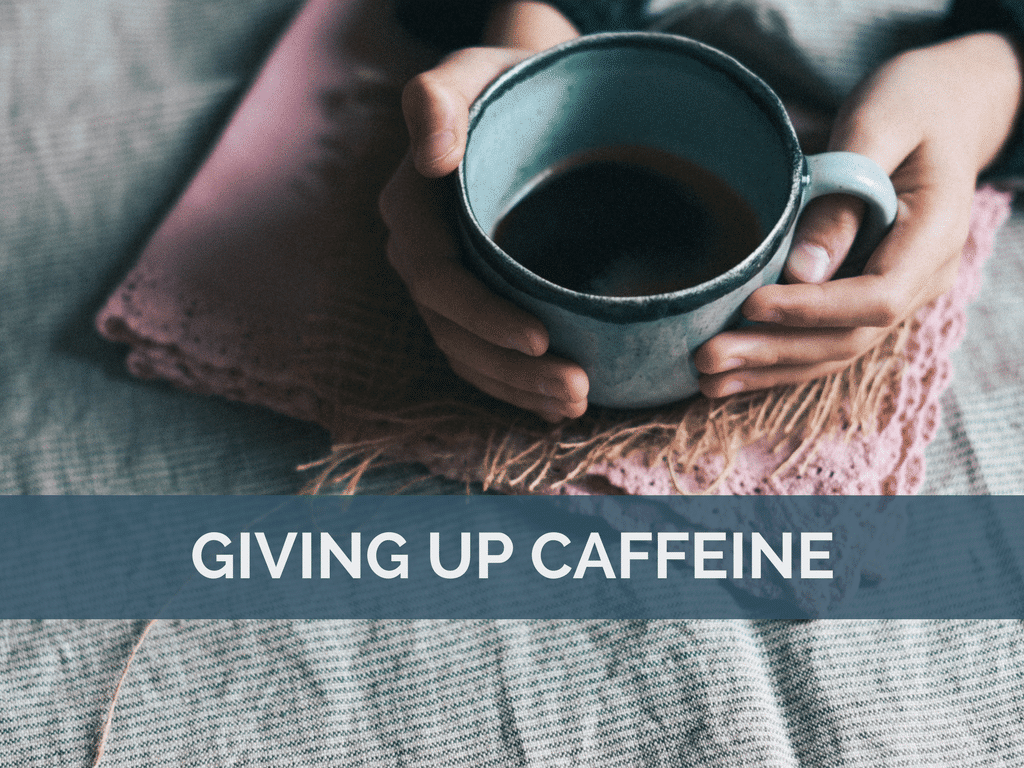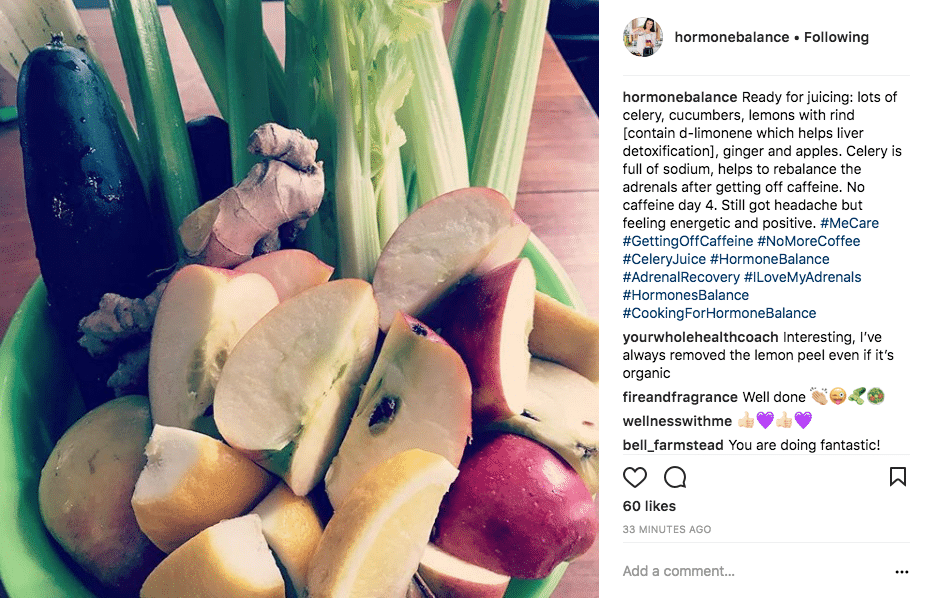Does Coffee Really Affect Me Negatively?
The only way to truly know if coffee and caffeine (found in white, black and green tea, including matcha tea) negatively impact your health, is to give it up and see how you feel.
To say outright that it does not impact you, without having tried, might be a skewed assumption probably stemming from fear and denial.
It’s normal to be in denial about caffeine.
After all, it is the world’s most used stimulant and, let me just say: It is a drug.
Why?
Because you crave it when you don’t have it. You feel good when you have it. You get withdrawals when you stop it.
It’s the same as being addicted to alcohol, cocaine, opioid painkillers, gambling, or sex.
I wrote a detailed article about how caffeine impacts your hormones – check it out.
If you feel like you are ready to quit, this blog post is a good follow-up piece.
First, let me tell you why I decided to kick this addiction.
What Led Me to Pull the Plug on ANYTHING Caffeinated
As much as I like to think that I’m a recovered Type A personality, at times, that might not be true.
The past 12 months have been busy.
After doing countless re-writes and recipe tweaks of my new protocol cookbook Cooking for Hormone Balance, I then went on to create a new online program called Herbs for Balance (with two herbalists) which took 300 hours to develop (just on my part). If you’ve done any of my programs, you know how well produced they are.
At the end of August 2017, I had a double hip replacement, and just 14 days after that surgery, we went into a full launch mode of the herbal program. It’s impossible for you to see what goes on at the backend, but my team would tell you it’s mayhem (no matter how organized we get) and we don’t sleep much during launches.
Then, to diversify the business, I partnered up with the best in the industry to develop and launch our own line of supplements (Wellena). That was another huge (and rewarding) project.
As that came to fruition, the book promotion plan kicked in: hiring new team members, planning, getting the pre-order bonuses ready (video, copy, visuals), and getting promotion partners and affiliates on board. My publisher always says that writing the book is just half the journey. Marketing the book is the second.
With little breaks in the past months (went to Italy in February to ski but that was stressful as I had so much to do and lost my laptop on one of the flights…), I’ve got to a place of feeling numb, fatigued, short-tempered and frankly, somewhat uninspired and feeling like I don’t care much about anything.
For me, that’s a sign that I am burned out. I felt the same way when I lived in Shanghai all those years back when first diagnosed with Hashimoto’s – I then resigned from my job.
I don’t plan to resign now.
I plan to do a few things to re-instate my health with self-care and love – stuff that works.
Starting with GIVING up CAFFEINE.
How Caffeine Has Affected Me
I’ve not been drinking much coffee as it makes me angry, impatient and my body smells really bad.
But, I have been drinking matcha – a ceremonial green tea. It still contains caffeine (1 teaspoon = 1 shot of espresso) and I’ve found myself drinking more and more of it to get me through the day.
With my history of addictions (and my genetics that make it easy for it to happen…), I’m like a former alcoholic – can’t even have a little bit. It’s very hard to admit it to myself but caffeine has been robbing me of my health and I’ve got to face the truth.
- I get dizzy when I get up.
- My hair has thinned out (probably due to thyroid and estrogen dominance).
- I’m physically weaker and can’t do strength training as well as I used to.
- I don’t sleep as well (I’ve started progesterone and it’s helping lots but still).
- My thyroid isn’t all that happy – I’ve started getting cold hands and feet; a sign of a potential Hashimoto’s flare-up.
- My energy tanks in the afternoons (and then I need another matcha).
- I crave caffeine and can’t stop thinking about having something caffeinated – a typical spinning cycle of an addict
Just reading this list makes me cringe.
However, I will not beat myself up for it because I didn’t hit rock bottom and I’m fixing my health proactively.
Bottom line:
I want to get my energy naturally from good food, occasional fasting, exercise and solid sleep.
Caffeine is fake energy and that’s especially dangerous when we have no reserves left. It’s like spending credit card money when there is no money in the bank account.
Wean Off or Go Cold Turkey?
To decide how to get off caffeine, you need to be perfectly honest with yourself and determine what type of person you are.
Have you given up bad habits in the past by weaning off them?
Or, do you wean off for 2 days and then find excuses to go back to it? That’s me. I know myself well enough to know that I need to go cold turkey.
But, the side effects are not pretty, especially when you have a business and/or a household to run.
In the past, I would go cold turkey and suffer for 2-3 weeks.
I got a little smarter this time.
Here is a list of things I’ve done this time around that helped a bunch:
Sea salt – I started the day with 1/4 teaspoon sea salt in a glass of water (also added some apple cider vinegar) – this has helped my adrenals and the headaches haven’t been that bad. I repeat that in the afternoons on days I had the headache (first 4 days).
Tyrosine – I’ve been doing 1000 mg of tyrosine x2 (before breakfast and lunch) which is a dopamine precursor. Caffeine gives us a dopamine hit so quitting can result in mood and motivation challenges. It’s been helping because my mood has been good.
Essential Oils – I’ve been experiencing a dull headache (in the past it used to be horrendous) – rubbing a drop of peppermint and lavender oil on the temples, reduced it by 80%. (Be sure the peppermint doesn’t get in your eyes).
Sodium – Juiced a bunch of celery (with cucumber, ginger, and apple) which, same as sea salt, is a source of sodium – that seems to be helping the adrenals. I drank 2 cups per day.
Magnesium – I upped my magnesium (I use Magnesium Replenish) to 800mg/day. I also took magnesium salt baths (Ancient Minerals) and that helped me to feel relaxed and reduced the headache. I also took Mag Energy (magnesium malate) to boost my energy levels and that helped a ton.
Vitamin B – I took our vitamin B Complex called B Maximus – it has certainly helped with energy levels and mental function. I felt like the headache subsided 20 minutes after taking it.
To learn more about how to balance your hormones with supplements (and which to take), you can download our FREE Supplement Guide here.
Napping – I quit over the WE so I didn’t have to deal with the withdrawals during a working week. This allowed me to take a few naps during the day – it felt so good to do that!
Lion’s Mane – the biggest issue in the first few days was the foggy brain. It felt as if my brain was struggling to make neurological connections. Lion’s Mane is a medicinal mushroom (the fresh version is often sold at farmers’ markets or health stores; it looks like a white sponge) that helps with alertness and focus. It helped a bunch. I interchangeably did a combo of Lion’s Mane from Four Sigmatic and a tincture from Host Defense. This was key to get me through my herbal program.
Cordyceps – these medicinal mushrooms have an incredible ability to boost energy levels. Giving up caffeine creates a temporary energy drop, this is a great way to mitigate it. I’m using Host Defense Cordeceps. This was key to get me through my herbal program classes and not fall asleep!
Water – the obvious. Drink at least 70 ounces (2 liters) of filtered RO water every day.
Electrolyte drink – I’ve found that my mind gets sharper and I get a lot more energy when I drink this mixture of salt, lemon juice and cream of tartar (a great source of potassium). Recipe for the Lemon Spritzer here.
Coffee replacement – for taste, I still like to have a warm cup of something. I love supporting local brands; Boulder has a wonderful company called Rasa Koffee (they sell on Amazon now too) that taste like coffee but is made from chicory, dandelion, burdock root and a few adaptogens – not only do these herbs detox the liver but also bring out natural energy in you.
Be prepared to be in a bad mood, have weird dreams, and sleep poorly. Some people even experience vomiting (that’s rare though).
On the upside:
- You will regain your own energy (generated naturally by the mitochondria) and enjoy it throughout the day.
- Your sleep may improve.
- You may experience less symptoms of estrogen dominance (such as PMS, lumpy boobs, cellulite, fibroids).
- You will have more energy to go back to exercise.
- You will be proud of yourself for not being dependent on a substance.
Make a #MeCare Commitment
One of the best ways to commit to doing something is to make an announcement to a larger group of people. This can be a great motivator to get started and stick to it.
And so I did.
I first recorded a pretty angry (with myself) Facebook Live video talking about how my addiction to matcha tea has led me to feel outright depleted.
I then kicked off the #MeCare commitment with this Facebook post (come on over if you want to join in).
If you prefer Instagram, just follow @hormonebalance and hashtag your posts with #MeCare (you will find others making their commitments already).
The idea is simple:
Most of us know what makes us feel good. Yet, we don’t do it at all or enough. This includes me.
Many women have already started posting. If you want to share yours, do so on this Facebook post or Instagram. Tag the post with #MeCare.
It could be something small like drinking 70oz of water every day to something big like getting off gluten and divorcing sugar.
I hope to see you there!
Learn more with Overcoming Estrogen Dominance

“The body has an amazing ability to heal. We just need to give it the right resources.”
In Overcoming Estrogen Dominance, my goal is to empower and give you the tools to take control of your hormones and health.
More than 70% of women experience estrogen dominance. The symptoms range from lumpy and fibrocystic breasts to thyroid nodules, hot flashes, fibroids, uterine polyps, painful, heavy or irregular periods to infertility and miscarriages, from mood swings to insomnia, weight gain to fatigue.
So many women have experienced the pain and frustration that comes when they feel their symptoms and complaints are dismissed or minimized. This is particularly true for women who are experiencing the symptoms of hormone imbalance. Even when doctors do offer treatment, it’s typically in the form of prescription medication or invasive surgical procedures.
In Overcoming Estrogen Dominance, I hope to show that those extreme interventions are often unnecessary, and to give women a roadmap to reverse estrogen dominance using food, herbs, supplements and natural protocols to rebalance hormones.
To get your copy of Overcoming Estrogen Dominance, go here.




quit dairy/meat… no more hip replacement…
I applaud your smart effort! Thanks for giving us a map to recovery. I have been reducing my coffee consumption slowly and am down to 1 cup per day but haven’t been able to go cold turkey.
Thank you for sharing Kakimi! We hope you are seeing progress
Very good id 🙂
[…] also wrote a blog post with tips and tricks I used to give up coffee. It will help guide you through the process of weaning yourself off […]
I quit coffee eight days ago, cold turkey for similar reasons. I’m curious to know if you think kombucha is ok to consume, or if it has too much caffeine. Thanks! P.S. I love my cookbook.
Definitely not a one size fits all. As a health practitioner I see more benefits for many people depending on what their total health issue is. Coffee is often the bad guy. If it organic it has a lot of benefits, including ergogenic. Some people need the extra acid, or have a fast metabolism like I do. Further more there are way too many hormone disrupters that raise estrogen etc, most likely it’s not coffee but a combination of other garbage and environmental factors that people accumulate. Detox is very important and coffee helps with that elimination. So like diets, they don’t work because we all have unique DNA. And coffee is not the culprit.
Except, obviously, for some it is
It took me 15 years to get over needing coffee. There is the same enzyme in coffee. pork, Coca=cola, Pepsi and egg that I have a highly allergic reaction with blisters erupting across my stomach.
I could have a cup of coffee once a month with no problem except for Tim Horton’s coffee. That makes me instantly break out in a painful rash.
[…] an article I wrote with tricks I used to give up coffee while reducing the side effects. It will help guide you through the process of weaning yourself off […]
İ’ve been a huge coffee and tea drinker. But im 30 days free of caffeine now and it feels so great. But i can’t stop my self from reading blogs about caffeine. İ drink now linden tea instead of black tea because linden tea has 0 caffeine. When i did my research i didn’t found any information about linden tea so if somone is going true this process.
Use linden tea and make live easy.
[…] headaches can come on as a result of a number of different things (including hangover, lack of caffeine, side effects from certain drugs, aneurysm, high blood pressure, spinal misalignment, a blow to the […]
Is cacao safe to drink instead of coffee or does it contain caffeine?
Hi Linda, cacao does contain some small amounts of caffeine but it is a safe option to drink. ~HB Support
Caffeine depleted tyrosine – that says it all. It also depletes iron and sodium. I had always felt even one coffee a day was somewhat harmful. – I felt it physically. Glad I stopped drinking caffeinated beverages.
Hi Sany, we’re glad you’re tuned in to your bodies needs and making adjustments that make you feel good. That’s something to be proud of! Keep up the great work. ~HB Support